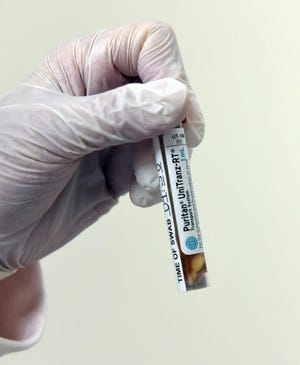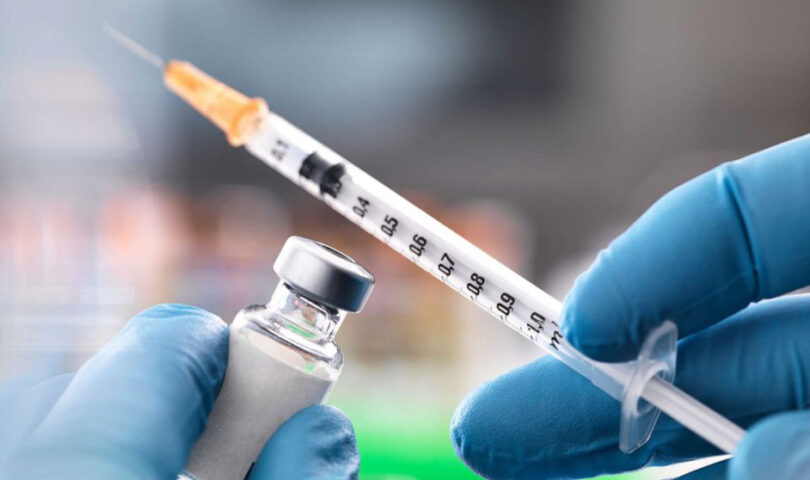DETROIT FREE PRESS — In the midst of another deadly coronavirus surge in a pandemic that has already taken more than 267,000 American lives, including 9,134 in Michigan, there’s hope on the horizon in promising news about potential COVID-19 vaccines.
Massachusetts-based biotech company Moderna applied Monday for emergency use authorization from the U.S. Food and Drug Administration for its coronavirus vaccine candidate on the heels of more encouraging data from late-stage clinical trials that suggest it is 94% effective and prevents severe illness in people with COVID-19.
Moderna is the second company to request federal approval for a potential coroanvirus vaccine. Pfizer — with its German-based partner BioNTech — asked regulators for emergency use authorization Nov. 20 for its coronavirus vaccine candidate.
Clinical trials suggest Pfizer’s vaccine is 95% effective against COVID-19 beginning 28 days after the first dose.
How soon can I get a COVID-19 vaccine?
An FDA advisory committee is expected to meet Dec. 17 to review the potential Moderna vaccine’s safety and efficacy, the company announced Monday. If it’s approved, the first doses of the vaccine could be given as early as Dec. 21, the New York Times reported.
The same committee is scheduled to discuss the Pfizer COVID-19 vaccine candidate Dec. 10. Pfizer said in a news release that its vaccine could be ready for distribution “within hours” of getting approval.
“We could be seeing both of these vaccines out and getting into people’s arms before Christmas,” Alex Azar, secretary of the U.S. Department of Health and Human Services, said Monday on “CBS This Morning.”
But that doesn’t mean most people will be able to call their doctors to get a vaccination before the New Year.
There will be limited supply — especially initially — of any vaccine that gets emergency use authorization. It could be months before there’s enough available for the general public to get immunized.
How effective are these COVID-19 vaccines?
Though neither company has published outcomes of its Phase 3 trials, early data from that research suggests the COVID-19 vaccine candidates are very effective.
In its Phase 3 trial of 30,000 people, Moderna’s vaccine candidate was shown to be 94.1% effective and prevents severe illness in people with COVID-19.
Of the 196 coronavirus cases evaluated among the people who took part in the trial, 185 were in the placebo group. Additionally, of the 30 people enrolled in the Moderna vaccine trial who had severe cases of COVID-19, all 30 were in the placebo group.
Clinical trials of Pfizer’s vaccine candidate suggest it is 95% effective against COVID-19 beginning 28 days after the first dose. Of 170 confirmed cases of COVID-19 evaluated in its Phase 3 trials of the Pfizer vaccine, the company reported 162 were among people in the group that got placebo. Eight cases were identified in the group that received the vaccine.
Are they safe?
Though safety reviews continue, so far no serious concerns have been identified for either Pfizer’s or Moderna’s COVID-19 vaccine candidates.
The most common side effects were injection site pain/redness, fever, fatigue, muscle and joint aches, and headache. Patients in the Moderna trials said the reactions were more pronounced after the second dose of the vaccine.

There was one COVID-19-related death in the Moderna vaccine study, but the person who died was in the group who received placebo rather than vaccine.
How many doses of the vaccine will each company produce?
Pfizer says it will produce up to 50 million doses of its vaccine globally in 2020 and up to 1.3 billion doses by the end of 2021.
Moderna also is scaling up its global manufacturing with an aim of delivering 500 million to 1 billion doses per year, beginning in 2021.
While those seem like huge numbers, it’s not enough to vaccinate the world’s population of roughly 7.8 billion people, which means doses will be distributed using priorities established by federal and state governments.
Additionally, both vaccines require two doses per person.
Who will get vaccinated first?
The U.S. Centers for Disease Control and Prevention is working with state public health officials to plan for distribution of COVID-19 vaccines.
The CDC’s Advisory Committee on Immunization Practices is planning an emergency session Tuesday to vote on a recommendation that health care providers should be vaccinated first, followed by residents of long-term care facilities, according to a STAT News report.
The Michigan Department of Health and Human Services drafted a plan it submitted to the CDC in October detailing how it would distribute COVID-19 vaccine doses.
Although spokeswoman Lynn Sutfin said the plan is still being revised, it shows that Michigan health care workers would get vaccinated first. Any doses the state receives initially would be delivered to 143 hospitals and health systems for that purpose.
After that, doses would be distributed to 45 local health departments, which would then stand up their own clinics to provide vaccines to vulnerable populations, including residents of long-term care facilities, first responders, and those ages 65 and older who are at highest risk of severe illness with a COVID-19 infection.
How many doses will Michigan get?
That remains unclear, Sutfin said.
“The exact number that will be allocated to Michigan is not known,” she told the Free Press on Monday.
“We are actively preparing with hospitals and local health departments so that the state can distribute and administer vaccines once they become available. We have heard this could be as early as mid-December, but no date has been finalized at the federal level.”
What are the distribution challenges?
Both the Pfizer/BioNTech and Moderna vaccines use brand new technology that’s never before been approved by the FDA. They both use messenger RNA and must be frozen for storage.
Moderna’s vaccine can be safely stored for up to six months at minus 4 degrees Fahrenheit, which is regular freezer temperature. It remains stable at standard refrigerator temperatures of 36-46 degrees Fahrenheit for 30 days. And it can be kept at room temperature for up to 12 hours, making Moderna’s vaccine easier to store and distribute than Pfizer’s.
Pfizer’s COVID-19 vaccine candidate is more challenging in that it requires ultra-cold storage of minus 94 degrees Fahrenheit. It can be stored at 36-46 degrees Fahrenheit for up to 24 hours or at room temperature for no more than two hours after it thaws.
How will Pfizer ship its ultra-cold vaccines?
The company developed thermal kits containing dry ice that can be used to keep vials of the vaccine ultra cold for up to 15 days of safe storage while they’re shipped. Most will come from the company’s Kalamazoo manufacturing site, Pfizer said in a news release.
If the FDA grants emergency use authorization of its vaccine, the company says it will deliver the kits by air to major hubs throughout the country, and then distribute them by ground transport directly to sites where the vaccines will be administered.
“We will utilize GPS-enabled thermal sensors with a control tower that will track the location and temperature of each vaccine shipment across their preset routes. These GPS-enabled devices will allow Pfizer to proactively prevent unwanted deviations and act before they happen,” the company said.
Will Michigan hospitals be able to store ultra-cold doses of Pfizer’s vaccines?
At least 31 hospitals and 11 local health departments now have ultra-cold freezer capabilities, Sutfin said, which is important for longer term storage of the Pfizer vaccine.
However, she said, “it is important to note that we expect the vaccine to be given to people very quickly after it is received, and they will be shipped in storage containers with dry ice that can be refreshed and will maintain the appropriate vaccine temperature. Thus, not every entity needs to have an ultra-cold freezer if they are able to receive and get the vaccine administered quickly, which is our expectation.”
Are there any other COVID-19 vaccines in the works?
Yes. There are dozens of other coronavirus vaccines in Phase 3 trials worldwide, and several of them are underway in the United States.
Among them are AstraZeneca’s investigational vaccine created with researchers at the University of Oxford and its spinoff company, Vaccitech.
The late-stage study of the vaccine, AZD1222 is underway at Beaumont’s Royal Oak hospital and at Michigan Medicine at the University of Michigan.
In addition, Janssen Pharmaceutical Companies, a division of Johnson & Johnson, also is in Phase 3 trials with a potential COVID-19 vaccine. Henry Ford Health System, Michigan Medicine and Cherry Health are partnering with Janssen in the Phase 3 trial, which is called the Ensemble study.
Both AstraZeneca’s vaccine candidate and Janssen’s are recombinant vector vaccines created by modifying the adenovirus, which causes the common cold, with the genetic spike protein found in SARS-CoV-2. It’s the same method used to create an Ebola vaccine that has recently been granted authorization by the European Commission.
Early data from AstraZeneca’s Phase 2/3 trials in the UK and Brazil showed its vaccine candidate ranges from 62% to 90% effective at preventing COVID-19, depending on how it is administered, and no hospitalizations or severe illnesses were reported among those who received the vaccine.
- Laker Men’s Basketball Handle Kuyper 88-55 - December 23, 2024
- MYWAY Sault Bridge Brawl & NEMWA Regional Results - February 22, 2024
- Crawford County Prosecutor clears State Trooper in the fatal shooting of man earlier this month - February 23, 2023




